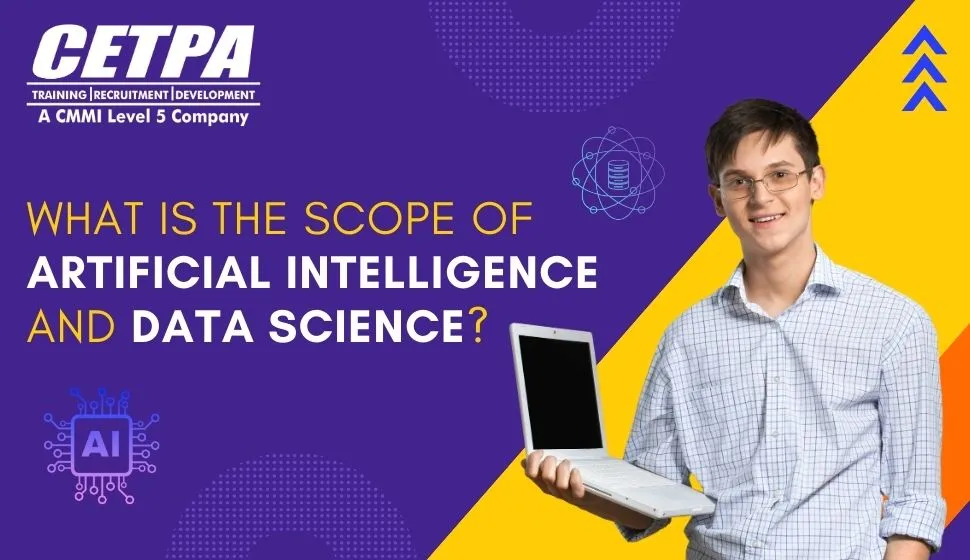What Is The Scope of Artificial Intelligence and Data Science?

In the current interconnected world, Artificial Intelligence and Data Science emerge as twin pillars impacting monumental shifts in technological innovations. Their symbiotic relationship transforms industries and also influences the way we perceive and interact with the world around us. AI, with its ability to replicate human intelligence, and Data Science, with its proficiency in extracting meaningful insights from large datasets, converge to develop unprecedented opportunities for innovation and progress. Together, the two form the bedrock of modern technological landscapes. This further fuels breakthroughs in multiple sectors like healthcare, finance, transportation, education, and more.
Further, as discussed in our Best Artificial Intelligence Course, one of the most vital impacts of this convergence is seen in automation. AI-powered systems evaluate large amounts of data with remarkable speed and accuracy, allowing automation of repetitive tasks across industries. This not only improves efficiency and productivity but also liberates human resources to concentrate on more strategic and creative endeavors. Additionally, the personalized experiences guided by AI and Data Science have transformed customer engagement and satisfaction. From personalized product recommendations to curated educational experiences, these technologies use data insights to cater to individual preferences and needs, promoting deeper connections and loyalty.
Thus, the scope of AI and Data Science expands beyond individual sectors, contributing to wider societal challenges like environmental sustainability and public safety. By evaluating environmental data and predicting natural disasters, AI and Data Science help in disaster preparedness and mitigation efforts, highlighting their ability to address global issues. In a nutshell, the convergence of AI and Data Science showcases a paradigm shift in how we tackle problem-solving, decision-making, and innovation. As these technologies continue to transform and advance, their revolutionary ability across different sectors will only continue to elevate. This thereby shapes the future of humanity in innovative and unprecedented ways.
Understanding Data Science:
As discussed at the Best Data Science Training Institute, Data Science is an interdisciplinary domain that integrates field expertise, programming skills, and statistical knowledge to extract insights and knowledge from structured and unstructured data. With techniques like data mining, they navigate complex datasets to determine patterns and anomalies, while machine learning algorithms allow predictive modeling and pattern recognition. Statistical analysis offers the framework for understanding data distributions and making inferences, while data visualization strategies convert abstract data points into visually intuitive representations, allowing comprehension and communication of insights. Data Science enables organizations to realize the full potential of their data assets by combining various approaches and tools, generating innovation, efficiency, and competitive advantage in today’s data-driven environment.
Also Read: Differentiating between Artificial Intelligence and Machine Learning

Exploring The Scope of Data Science:
In the age of big data, Data Science stands out as a vital discipline. It blends the expertise of multiple disciplines to reveal profound insights hidden within large datasets.
The wide scope of data science is as follows:
- Predictive Analytics: Data Science facilitates predictive modeling and forecasting by evaluating historical data to determine future trends and outcomes. From sales forecasting and demand planning to risk evaluation and customer churn prediction, predictive analytics allows for data-driven decisions.
- Business Intelligence: Data Science propels business intelligence initiatives by converting raw data into actionable insights. Data visualization tools and dashboards allow stakeholders to monitor key performance indicators, determine opportunities, and optimize business processes.
- Healthcare Informatics: Data Science plays a major role in healthcare informatics by evaluating electronic health records, medical imaging data, and genomic data. Predictive analytics and machine learning algorithms help in disease diagnosis, treatment planning, and patient outcome prediction.
- Marketing Analytics: The concerned field informs marketing strategies by assessing customer demographics, behaviour patterns, and purchase history. Marketing analytics allows targeted advertising, personalized marketing campaigns, and customer segmentation, resulting in enhanced ROI and customer engagement.
- Fraud Detection: Data Science algorithms identify fraud activities by evaluating transactional data, user behaviour, and network patterns. In finance, insurance, and e-commerce sectors, fraud detection systems eliminate risks, minimize losses, and guarantee regulatory compliance.
- Recommendation Systems: Data science fuels recommendation systems, which personalize content and product recommendations based on user preferences and previous interactions. Collaborative filtering and content-based recommendation algorithms improve user experience and increase sales.
- Social Media Analytics: Data Science techniques evaluate social media to extract insights into customer behaviour, brand perception, and market trends. Social media analytics inform marketing strategies, reputation management efforts, and crisis communication responses.
Understanding Artificial Intelligence:
Artificial Intelligence (AI) emerges as a frontier in computer science, aiming to offer machines with human-like capabilities. It comprises a wide range of technologies, each contributing to different aspects of intelligence imitation. Machine learning algorithms taught in the Best Machine Learning Course allow AI systems to learn from data and enhance performance over time. On the contrary, natural language processing equips machines to understand and generate human language. Further, computer vision allows AI systems to interpret and evaluate visual information, similar to human perception, while robotics integrates AI to allow autonomous decision-making and physical interaction with the environment. Together, these technologies develop a comprehensive toolkit for building intelligent machines. Machines are capable of adapting, reasoning, and interacting in ways previously thought exclusive to human intelligence, transforming industries and societal paradigms in the process.

Navigating The Scope of Artificial Intelligence (AI):
In today’s ever-changing technological landscape, Artificial Intelligence (AI) emerges as a revolutionary force, transforming industries and redefining human capabilities.
The scope of Artificial Intelligence (AI) is as follows:
- Automation: AI technologies allow automation of repetitive tasks across industries, resulting in better efficiency and productivity. From manufacturing and logistics to customer service and finance, automation simplifies processes and minimizes operational costs.
- Personalization: AI-powered algorithms evaluate large amounts of data to personalize user experiences. Whether recommending products, curating content, or crafting marketing campaigns, AI improves customer engagement and satisfaction.
- Healthcare: In healthcare, AI allows for early disease detection, medical image analysis, drug discovery, and personalized treatment plans. AI-driven innovations enhance patient outcomes, optimize clinical workflows, and transform healthcare delivery.
- Autonomous Vehicles: AI algorithms allow autonomous vehicles to perceive their ecosystem, make decisions, and explore safely without human intervention. This technology can revolutionize transportation, improve road safety, and minimize traffic congestion.
- Finance: AI algorithms assess financial data to identify fraud, predict market trends, and optimize investment portfolios. AI-driven financial services improve risk management, automate trading strategies, and enhance decision-making processes.
- Education: AI-powered education platforms offer personalized learning experiences curated to individual student demands. Adaptive learning algorithms optimize curriculum design, evaluate student performance, and improve educational outcomes.
- Environmental Sustainability: AI technologies contribute to environmental sustainability by assessing data to optimize resource allocation, forecast natural disasters, and eliminate climate change. AI-drive solutions foster energy efficiency, waste minimization, and conservation efforts.
Conclusion:
To summarize, Artificial Intelligence (AI) and Data Science are more than just technological improvements; they are catalysts for massive changes in how corporations, societies, and individuals interact with the environment. Their integration has the potential to revolutionize businesses across the board, from simplifying operations through automation to providing hyper-personalized experiences for customers.
Furthermore, AI and Data Science have had a significant impact on fields such as healthcare and environmental sustainability. These technologies provide unparalleled prospects for early illness detection, personalized treatment, and environmental conservation. Organizations may use AI algorithms and advanced analytics to make better decisions, optimize resource allocation, and reduce risks. As we continue to realize the full potential of AI and Data Science, the opportunities for innovation and growth are endless.
Thus, embracing new technologies is more than a strategic need for organizations; it is a moral commitment to accelerate progress toward a smarter, more efficient, and sustainable future. Hence, by using the power of data and AI-driven technologies, we are paving the way for disruptive change that crosses industry borders and accelerates humanity toward a brighter future.
Tag:Artificial intelligence online course, Artificial intelligence online training, Best Artificial Intelligence Certification Course, Best Artificial Intelligence Course, Best Artificial Intelligence Training, Best Artificial Intelligence Training Institute, Best Data Science Certification Course, Best Data Science Course, Best Data Science Training, Best Data Science Training Institute, Best Machine Learning Certification Course, Best Machine Learning Course, Best Machine Learning Training, Best Machine Learning Training Institute, Data Science Online Certification Course, Data Science Online Certification Training, data science online course, data science online training, Machine learning online Course, Machine learning online training



